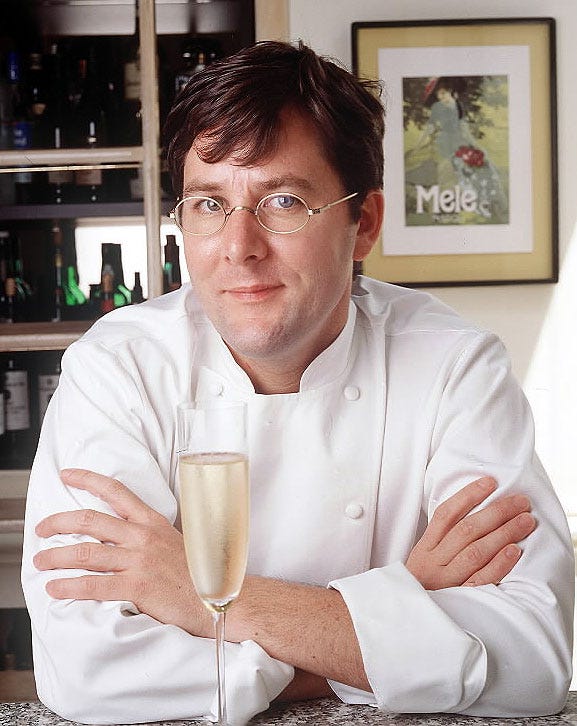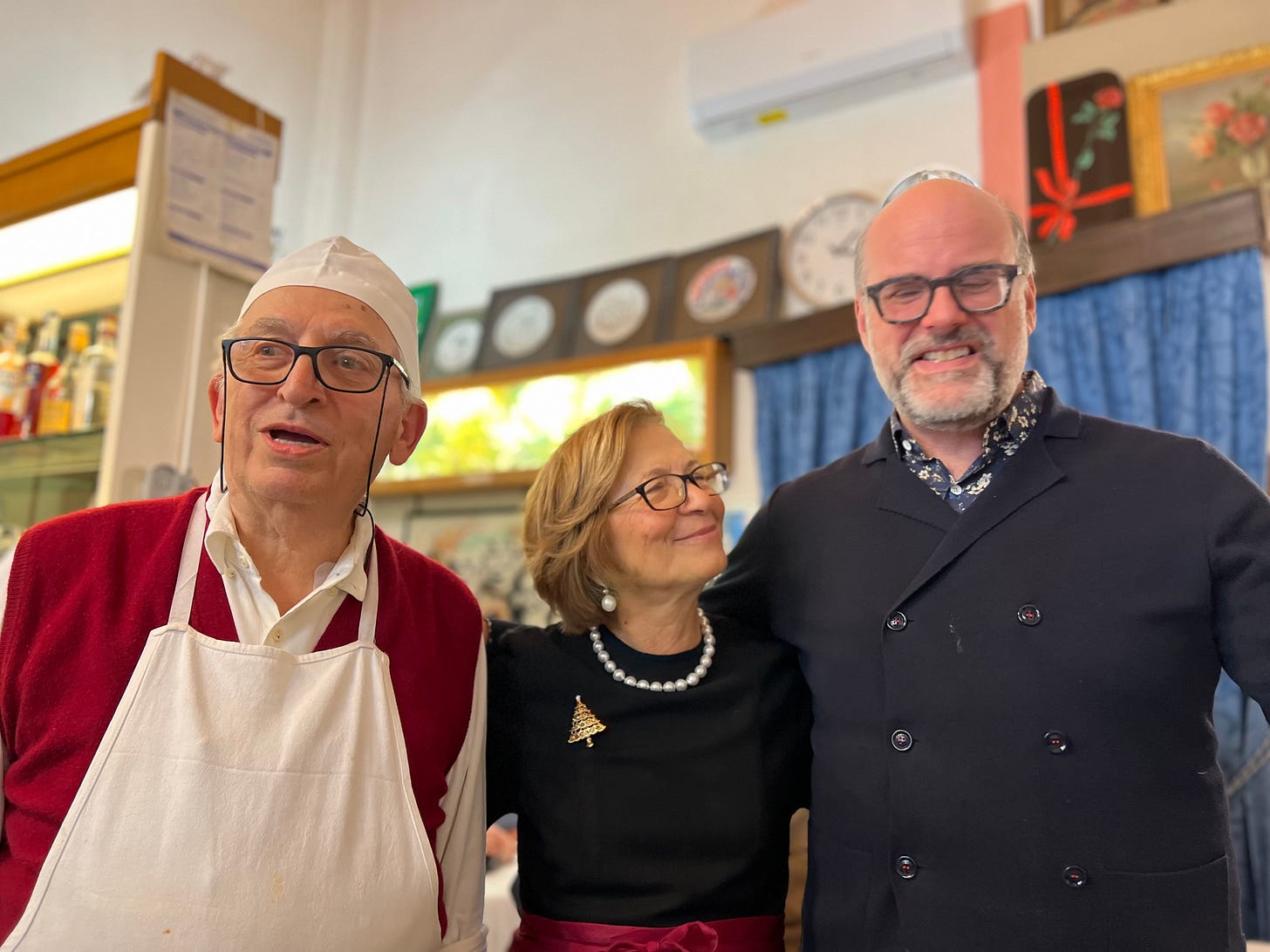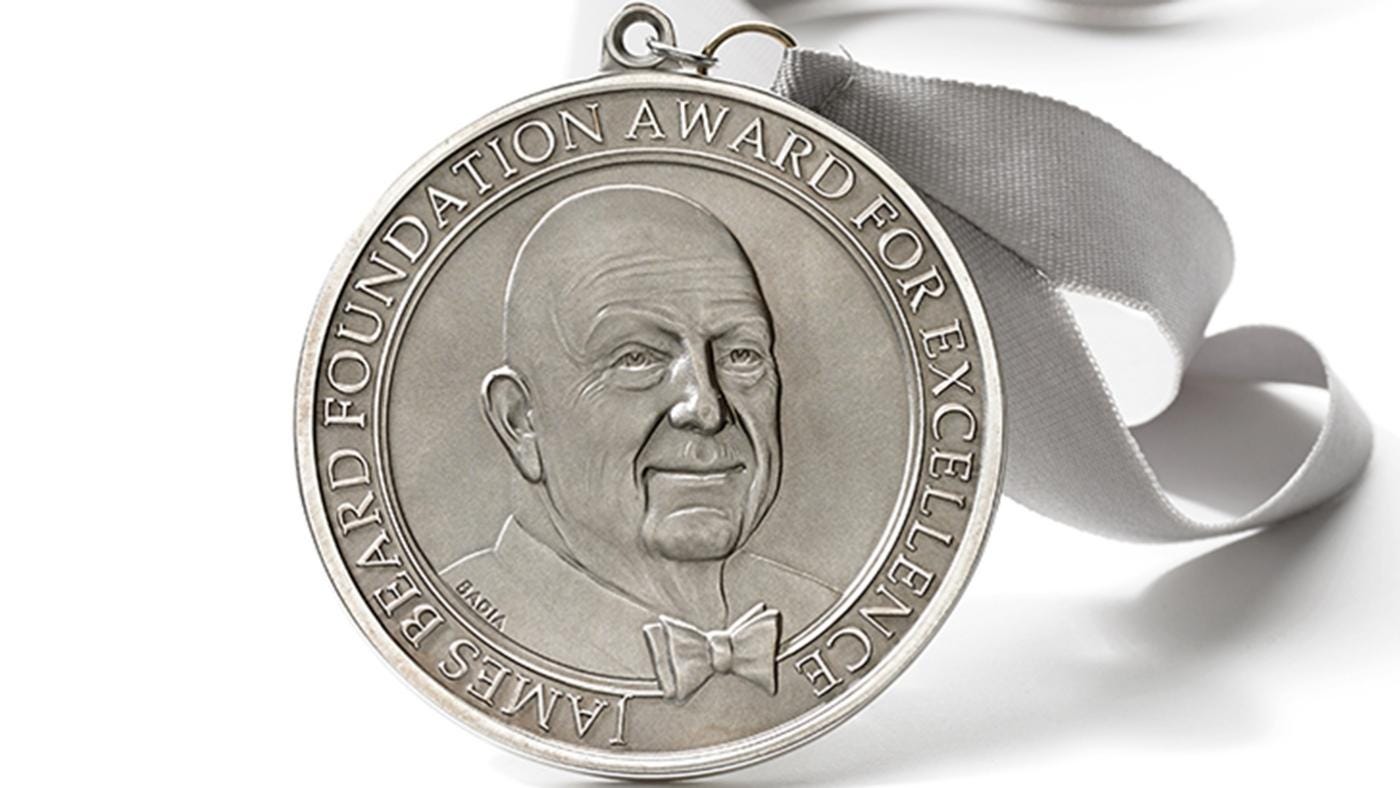BONUS Issue #158: Some of My Favorite Restaurants
Thoughts on Awards, What Makes a Great Restaurant, Some Personal History, My Idiosyncratic List
As I sit here in my lovely hotel room at Wynn Las Vegas, feeling a little melancholy in the dénouement of the 2024 celebration of the 50 best restaurants in the world—at least according to the panel of 1,000+ judges who voted for San Pellegrino’s World’s 50 Best, of which I was one— and on the eve of the James Beard Foundation Awards in Chicago, I can’t help but think about my favorite restaurants around the world and what it is exactly that I like so much about them.
Awards always make me a little sad.
Curiously, I’ve been associated with restaurant awards for more than 30 years, since the summer after I graduated from Cornell’s Hotel School and a professor/mentor of mine, Tom Kelly, oversaw the creation of a new American Express sponsored award program called DiRONA, short for Distinguished Restaurants of North America.
DiRONA was conceived in 1990 by a group of restaurateurs after the news that the Travel Holiday Dining Awards would no longer recognize fine-dining establishments. Started in 1952 by Holiday magazine, the Holiday Dining Awards, which were renamed the Travel Holiday Dining Awards when Holiday merged with Travel magazine in the 1970s, were considered an important honor for restaurants throughout those decades, when North Americans were traveling more to Europe and they began to take eating out more seriously. But when Travel Holiday magazine was sold to Readers Digest in 1989, the new management shelved the awards for fine-dining restaurants. Then, as now, folks were predicting the death of fine dining in America.

The summer after college, 1991, I traveled around the U.S. and Canada for DiRONA, eating my way through restaurants at a digestively challenging clip. The popularity of the Zagat guides was growing at the time, but unlike Zagat, which employed the very American model of surveying diners about their favorite places to eat, we raised enough money to send anonymous inspectors to dine in every restaurant under consideration, à la Michelin. I recall a particular eight-day trip to Chicago, where my college roommate had moved, during which I ate in 24 restaurants—a lunch and two dinners every day. Those were some of the best and some of the worst meals of my life.
After DiRONA, I went on to help Professor Kelly revive the comprehensive Mobil Travel Guides, whose five-star rating system for restaurants had been established decades prior, but whose impact and validity had suffered under different publishers. In the 1990s, Random House’s Fodor’s travel imprint acquired the rights to the Mobil guides and we were hired to revive their inspection program. I had written several city dining guides for Fodor’s. But the entire U.S. was big. There were too many restaurants in the multiple volumes of the Mobil guide to get to all of them, so we divided the country into six regions, hired a lead inspector for each one, and set out to eat in the four- and five-star places. We supplemented our hit lists with input from Zagat ratings, local critics, and other recommendations from people we trusted. It was a grueling schedule that got me to Las Vegas often because, even though my region was New York City and the Northeast, nobody wanted Vegas. I took it.
In 1993, I joined the James Beard Foundation as Director of Publications, which had launched its awards program two years prior. The awards quickly established this little organization devoted to promoting American chefs and gastronomy born after the posthumous purchase of James Beard’s Greenwich Village house as an important tastemaker. The American restaurant industry was still young, chefs were not yet household names. The Food Network wouldn’t be available in the New York area until the following year. Without a Michelin of our own, the Beard Awards were really a turning point for our restaurant industry, as well as for the foundation. I stayed with JBF for the next 27 years, watching the influence and impact of the awards and of American chefs grow.
I’ll note that during that time, like all JBF staff, I was never able to vote. (In 2003, however, I was able to be nominated for JBF Journalism Award for a piece I wrote on Tokyo restaurant for the Art of Eating.) Perhaps irresponsibly, I never even fully understood how the awards functioned. We were kept at arms length until my last few years at the organization, by which time I had risen to Chief Strategy Officer, when I helped push to make the awards more inclusive and more reflective of the values of true leadership that we were helping to cultivate within the industry.
During my JBF tenure, I attended 26 awards ceremonies. I missed 2015, the first year they moved to Chicago, because I was living in Milan to oversee the USA Pavilion at Expo Milano. If you count the year I attended prior to coming to work at JBF, I’ve seen 27 JBF awards ceremonies through. Though the logistics and communications for the events each year were my main focus, and I was always rooting for the people whom I admired, my feelings were always mixed at the end. There is much more disappointment than joy in a competition when only one in five wins, and behind those five, hundreds, maybe thousands more are deserving.
In 2010, while still working at JBF, I was invited to become an Academy Chair for the World’s 50 Best restaurants, a London-based program started by the U.K. industry Restaurant magazine and since spun off, that produced a ranking of the best restaurants in the world according to a survey of international panelists of food journalists, diners, and chefs. The list was already commanding tremendous attention in the international media, and its influence would grow exponentially in the coming years. A spot on the list can turn a struggling restaurant into an overnight success.
I hate that someone has to always “win” something, and I particularly hate that such “winning” is, for many, the most important form of validation. Perhaps because I went to a Jewish day camp in Canada with socialist leanings, where every camp-wide competition ended in a tie, it just makes me sad that in order for someone to win, someone else, many others, in fact, have to lose. Considering all of the effort, emotion, and money it takes to run any and every restaurant, it just doesn’t seem fair or even feasible to judge one the best.
I’m not saying, of course, that some teams of people don’t do things better than others, nor that there isn’t some sort of exceptional talent or inspiration that sets one chef off from the rest. I have my favorite restaurants, which I will share with you in a bit. But for all the attempts to make awards programs “objective,” “accurate,” “tamper proof,” and what have you, what makes a great restaurant, delicious food, a warm environment, exceptional hospitality is completely and utterly subjective. And people’s opinions are too readily influenced by what other people say, what they read, how things are ranked—in an important essay in Commentary, the late critic Steven Shaw called this the “Zagat Effect”—so the results of these sorts of vote-based awards are always questionable #imho. In the midst of an American election cycle, you don’t have to look far to see examples of how “voting” isn’t always the way to get the best result.
What’s more, restaurants are so different, one from another, that ranking them seems foolish. How do you compare a late-night Thai omelet stand to the dining room of a grand hotel with a full Escoffier-esque brigade? Can there possibly be a tangible difference between the restaurant ranked 17 and the one ranked 18? And if there were, how would we measure it? In these voting-based systems, that difference could just be one person’s opinion. Such questions intrigued me so much, I wrote a doctoral dissertation about it (see A Taste for New York).
For years I’ve been mulling over the concept of authenticity to try to explain what I like about certain restaurants. And I don’t mean that word in the problematic sense that a restaurant is accurately recreating the food of someplace else. I mean it in the sense of being authentic to one’s self, to one’s values, to a continuous pursuit of improvement and evolution. Prehaps because of my Taoist training, I truly believe that we are, or should all be, on a journey of self-improvement, whether we are talking about how we cook, our commitment to sustainability, or how we help others improve themselves. This stops me short of promoting any one person or thing as the best.

If you tell me you are perfect, I will lose interest. If you tell me that every day you try to be better, you will keep my attention. If we could conceive of an award that recognizes how restaurants, chefs, food, management, environmental impact, health, and hospitality have improved from year to year, I might feel better about them. I like cooks and restaurants with a strong point of view, a sense of right and wrong, regardless of what their customers or the press say. I like cooks who are always striving to be better, not to win.
Anyway, this is all a long lead up to a short, totally subjective list of a few of my favorite restaurants in the world. As with my other dining guides—for Tel Aviv, London, and Paris—I’m putting this one behind a pay wall. Because I think that everyone should be able to cook well, my recipes are always free. But if you can afford to jet-set around the world eating in fine restaurants, you can afford to support my work.
This idiosyncratic list of favorite restaurants may or may not be useful to you. It is utterly incomplete. But these are a few places I’m always longing to get back to. Perhaps that, more than anything else, is what determines a “best” restaurant. And every time I do return, they seem better than I remember. They make me feel better.
Until last December, Latteria San Marco in Milan would have been on this list (see Issue #32), but Maria and Arturo decided to call it quits after 57 years. I felt so lucky to have eaten so many meals there, and to have coincidentally been in Milan during their final week. Perhaps they show that you develop a global reputation and succeed just by being your authentic self and doing what you do. We should all have places like Latteria in our dining orbits, where the ingredients, the food, and the relationships you build nourish our bodies and our souls. Here are a few more of mine.






